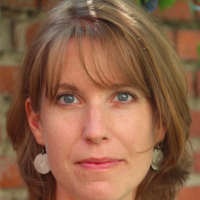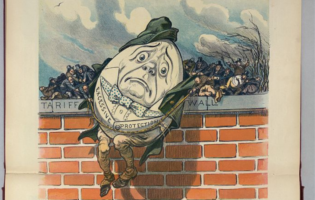The Specter of Uncertainty: Policies for Strengthening the Transatlantic Relationship from the Next Generation of Leaders

Anne J. Kantel
American University
Anne J. Kantel is a PhD candidate at the School of International Service at American University with a focus on environmental politics and political violence. Her dissertation research looks at the interaction of state and local fisheries management practices in Uganda, and the effects of these encounters on issues of compliance, legitimacy, and the production of knowledge(s). Her work engages with broader questions of justice, power and equality in today’s world and draws on insights from various fields, such as critical IR theory, feminist studies, political geography, and cultural anthropology. In addition to her dissertation research, Anne J. Kantel is actively involved in research analyzing issues of identity, territory, and conflict in International Relations. She is the co-author of “Accepting the Unacceptable: Lessons from West-Germany’s Changing Border Politics.”
She is a 2016-2017 participant in AICGS’ project “A German-American Dialogue of the Next Generation: Global Responsibility, Joint Engagement,” sponsored by the Transatlantik-Programm der Bundesrepublik Deutschland aus Mitteln des European Recovery Program (ERP) des Bundesministeriums für Wirtschaft und Energie (BMWi).

Eric Langenbacher
Senior Fellow; Director, Society, Culture & Politics Program
Dr. Eric Langenbacher is a Senior Fellow and Director of the Society, Culture & Politics Program at AICGS.
Dr. Langenbacher studied in Canada before completing his PhD in Georgetown University’s Government Department in 2002. His research interests include collective memory, political culture, and electoral politics in Germany and Europe. Recent publications include the edited volumes Twilight of the Merkel Era: Power and Politics in Germany after the 2017 Bundestag Election (2019), The Merkel Republic: The 2013 Bundestag Election and its Consequences (2015), Dynamics of Memory and Identity in Contemporary Europe (co-edited with Ruth Wittlinger and Bill Niven, 2013), Power and the Past: Collective Memory and International Relations (co-edited with Yossi Shain, 2010), and From the Bonn to the Berlin Republic: Germany at the Twentieth Anniversary of Unification (co-edited with Jeffrey J. Anderson, 2010). With David Conradt, he is also the author of The German Polity, 10th and 11th edition (2013, 2017).
Dr. Langenbacher remains affiliated with Georgetown University as Teaching Professor and Director of the Honors Program in the Department of Government. He has also taught at George Washington University, Washington College, The University of Navarre, and the Universidad Nacional de General San Martin in Buenos Aires, Argentina, and has given talks across the world. He was selected Faculty Member of the Year by the School of Foreign Service in 2009 and was awarded a Fulbright grant in 1999-2000 and the Hopper Memorial Fellowship at Georgetown in 2000-2001. Since 2005, he has also been Managing Editor of German Politics and Society, which is housed in Georgetown’s BMW Center for German and European Studies. Dr. Langenbacher has also planned and run dozens of short programs for groups from abroad, as well as for the U.S. Departments of State and Defense on a variety of topics pertaining to American and comparative politics, business, culture, and public policy.
__

Magdalena Kirchner
Magdalena Kirchner, Ph.D. is a political scientist and conflict researcher, currently a Transatlantic Postdoctoral Fellow in International Relations and Security (TAPIR) at the RAND Corporation in Arlington, VA. Previously, she held research positions at the German Institute for International and Security Affairs (SWP) and the German Council of Foreign Relations (DGAP) in Berlin. Since 2009, she has co-edited the Security Policy Reader, published by the Federal Ministry of Defense. Throughout 2014 and 2015, she worked as Senior Project Coordinator at the German Atlantic Association and was a member of the extended board of Women In International Security Germany. Since 2015, she has served as Vice President of the Youth Atlantic Treaty Association, whose German chapter she has headed since 2014. Magdalena studied Political Science and History in Heidelberg and Aarhus, DK, and holds a doctoral degree from the University of Heidelberg. Before relocating to Berlin in 2012, she was a lecturer at the Institute for Political Science at the University of Heidelberg, head of the Working Group “Conflicts in the Middle East and Maghreb” of the Heidelberg Institute for International Conflict Research, and gained international work experience at think tanks and research institutions in Turkey, Israel and Jordan.
She is a 2016-2017 participant in AICGS’ project “A German-American Dialogue of the Next Generation: Global Responsibility, Joint Engagement,” sponsored by the Transatlantik-Programm der Bundesrepublik Deutschland aus Mitteln des European Recovery Program (ERP) des Bundesministeriums für Wirtschaft und Energie (BMWi).

Marianne Schneider-Petsinger
Chatham House
Marianne Schneider-Petsinger is geoeconomics fellow in the US and Americas Programme at Chatham House, responsible for analysis at the nexus of political and economic issues. Before joining Chatham House, she managed the Transatlantic Consumer Dialogue – an international membership body representing consumer organizations in the EU and US. She also worked on transatlantic economic issues at the American Institute for Contemporary German Studies (AICGS) in Washington, DC and at the Ministry of Economic Affairs in the German state of Thuringia. Her research interest lies in the area of trade and transatlantic economic cooperation. Marianne completed her graduate studies focusing on international trade and finance at the Fletcher School of Law and Diplomacy (Tufts University) and the John F Kennedy School (Harvard University). She holds a BA in International Affairs and Economics from the University of Maine. Marianne is originally from Germany and spent almost ten years in the US. She is now based in London.
She is a 2016-2017 participant in AICGS’ project “A German-American Dialogue of the Next Generation: Global Responsibility, Joint Engagement,” sponsored by the Transatlantik-Programm der Bundesrepublik Deutschland aus Mitteln des European Recovery Program (ERP) des Bundesministeriums für Wirtschaft und Energie (BMWi).

Rachel Rizzo
Center for a New American Security
Rachel Rizzo is the Research Associate for the Strategy and Statecraft Program at the Center for a New American Security (CNAS). Her work focuses on U.S. foreign policy and defense strategy, geopolitics, NATO and Europe. Prior to joining CNAS, Ms. Rizzo worked on the Strategy Initiative at the Atlantic Council’s Brent Scowcroft Center on International Security. She also has previous work experience with Goldman Sachs, the Office of the Under Secretary of Defense for Policy, the National Defense University, and the U.S. Mission to NATO. Her writing has appeared in Politico Europe, Defense One, Defense News, the Hill, the National Interest, and War on the Rocks. Ms. Rizzo received her M.A. in Security Policy Studies from the George Washington University’s Elliott School of International Affairs where she focused on Defense Analysis and Homeland Security Policy. She graduated from the University of Utah in 2010 with a B.A. in Finance.
She is a 2016-2017 participant in AICGS’ project “A German-American Dialogue of the Next Generation: Global Responsibility, Joint Engagement,” sponsored by the Transatlantik-Programm der Bundesrepublik Deutschland aus Mitteln des European Recovery Program (ERP) des Bundesministeriums für Wirtschaft und Energie (BMWi).
Vincent Dreher
Otto Suhr Institute for Political Science, Free University Berlin
Vincent Dreher was a DAAD/AICGS Research Fellow in October-November 2016. He is Research Associate at the Center for International Political Economy at the Otto Suhr Institute for Political Science of the Free University Berlin. He is currently pursuing a PhD on the subject of international financial market regulation after the crisis of 2007-09, with a focus on the newly created Financial Stability Board. Among his recent conference contributions are papers on financial regulation in Eastern Asia, the role of transnational experts in international regulatory institutions, and political and economic challenges in the Eurozone. For a paper on the regulatory initiative addressing systemically important financial institutions, he received the Best Graduate Student Paper Award 2016 of the International Political Economy section of the International Studies Association (ISA). His teaching experience at the Otto Suhr Institute includes courses on the history of international money and finance, the politics of economic growth, and modern transformations of the state. Mr. Dreher holds an M.A. in International Relations from Free University Berlin, Humboldt University Berlin, and University of Potsdam, a Graduate Diploma in Economics from the University of Essex, and a B.A. in Political Science from the University of Bremen. His research has been funded by the Friedrich-Ebert-Foundation and the DAAD.
He is a 2016-2017 participant in AICGS’ project “A German-American Dialogue of the Next Generation: Global Responsibility, Joint Engagement,” sponsored by the Transatlantik-Programm der Bundesrepublik Deutschland aus Mitteln des European Recovery Program (ERP) des Bundesministeriums für Wirtschaft und Energie (BMWi).
Policy Report 65
AGI is pleased to present the written results of the first year of its new project “A German-American Dialogue of the Next Generation: Global Responsibility, Joint Engagement.” The six authors together with several other young Americans and Germans engaged with each other during the course of several months in 2016/17 in discussions to identify solutions to global issues of concern for the transatlantic relationship. The purpose of the project is to emphasize the important role of the next generation of transatlantic leaders and experts and to give them a platform and voice in the critical dialogue of crucial global issues that require joint transatlantic attention and solutions. The project participants come from a variety of disciplines and have a wide array of expertise. Representing the three AGI Program Areas—Foreign & Domestic Policy; Business & Economics; and Society, Culture & Politics—the participants formulated a set of recommendations that were presented in a variety of venues and through innovative means. The essays presented in this Policy Report summarize the outcome of a year-long engagement with current critical transatlantic issues, which included the future of trade agreements, the role of civil society in conflict resolution, and the rise of populism as a threat to European cohesion.









